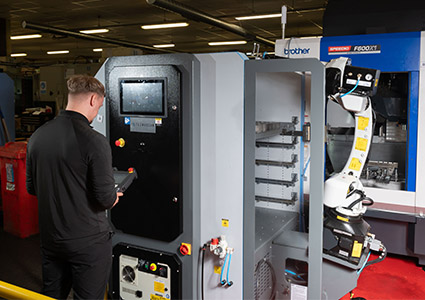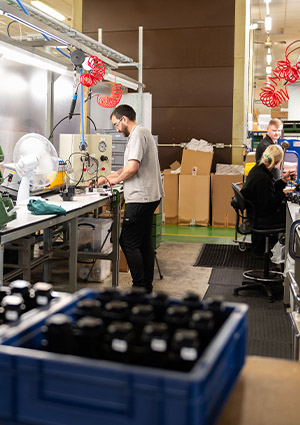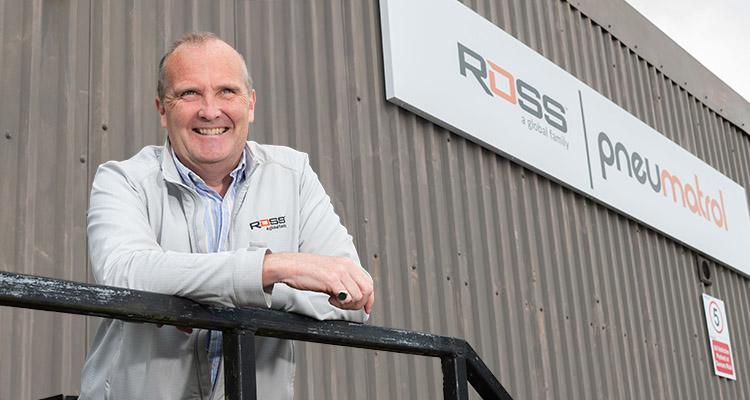Discover how artificial intelligence is transforming ROSS Pneumatrol’s precision manufacturing processes
Headquartered in Lancashire, UK, ROSS Pneumatrol is a specialist manufacturer providing engineered pneumatic solutions for use within both hazardous and non-hazardous environments. Throughout its rich history spanning over six decades, ROSS Pneumatrol has developed the technical and manufacturing expertise, as well as the market knowledge necessary to meet the demands of the process, rail, energy, and industrial sectors. Its extensive portfolio encompasses a diverse range of pneumatic and electro-pneumatic products, carefully crafted to meet each customer’s unique needs and requirements, whether they require standard or bespoke solutions. Jamie Dummer, Managing Director, breaks down the structure of ROSS Pneumatrol, starting with an overview of its roots.
 “The Pneumatrol side of the company was founded more than 60 years ago, while the ROSS Group, established in Michigan in 1921, is exactly 103 years old. In its original form, Pneumatrol was named RGS Electro-Pneumatics and was incorporated in 1963, before becoming part of the ROSS family in 2019. Prior to selling the business to ROSS, I was a co-owner of Pneumatrol, working with a relatively small team. Pneumatrol has always been based in Accrington, Lancashire, with a factory in a little village called Oswaldtwistle, spanning around 20,000 square feet. With £7.5 million in turnover, we are specialists in niche areas, not a very large company, but experts in our field,” he begins.
“The Pneumatrol side of the company was founded more than 60 years ago, while the ROSS Group, established in Michigan in 1921, is exactly 103 years old. In its original form, Pneumatrol was named RGS Electro-Pneumatics and was incorporated in 1963, before becoming part of the ROSS family in 2019. Prior to selling the business to ROSS, I was a co-owner of Pneumatrol, working with a relatively small team. Pneumatrol has always been based in Accrington, Lancashire, with a factory in a little village called Oswaldtwistle, spanning around 20,000 square feet. With £7.5 million in turnover, we are specialists in niche areas, not a very large company, but experts in our field,” he begins.
The combined expertise of ROSS and Pneumatrol enable the company to offer a broad range of products in niche markets, as Jamie highlights: “Our portfolio consists mainly of pneumatic products, mainly compressed air, but also nitrogen, oxygen, and other gases. Through the ROSS Group, part of our portfolio encompasses hydraulics, such as hydraulic valves. We offer two primary types of valves, and most of them are controlled by a solenoid. A solenoid is an electrically controlled mechanism that, when activated by a button press, opens or closes a gas flow or valve. In other words, the button controls the solenoid valve, which then allows the gas to flow. Our unique selling point is that a lot of our solenoids are approved for use in hazardous areas, so they can operate in environments where there is a risk of explosion due to gas or dust clouds. When a device containing compressed air has an electrical component, such as a solenoid, in an environment with the potential for explosions, it is crucial to ensure that the solenoid or device cannot cause an explosion or fire.
Precise and reliable
“These products are designed for the process and industrial sectors and are used in petrochemical, pharmaceutical, brewing, and distilling plants. Despite being a small business, we supply our products globally, with two-thirds of our output being direct exports going all over the world. Different international standards cover explosion-proof specifications, and we have products approved to standards for nearly every part of the industrialized globe, namely North and South America, Europe, India, Japan, Korea, and Australia.
“Additionally, we cater to the arduous environments of the transport sector, with products that can be mounted on the underside of trains, for example. Through the ROSS brand, we supply many products used in glass bottle blowing machines, which are large, complex, and potentially dangerous machines operating at high speeds. This then feeds into a strategically important area for us at ROSS Pneumatrol, which is fluid power safety, a market where we believe we can grow and serve well by teaching customers to better understand the risks that can exist through fluid power within their plants and allow them to control those more safely,” he elaborates. 
Such critical products require precise and reliable manufacturing methods, which is why ROSS Pneumatrol embraces technological advancements. “When investing in new machinery and technology, we require them to produce quality parts for as much of the 24-hour day as possible. To ensure this is the case, we have implemented live data capture, allowing for real-time reporting from all machines. We use a software suite called Cimco, which provides data to our operations management team on their phones, enabling them to monitor machine status remotely. They can also dial the machines to determine whether any required adjustment can be made without physically coming in. We have invested both time and money in developing this capability, working as a team to transform raw data into information for decision-making.”
AI-driven solution
Turning to the topic of artificial intelligence (AI), Jamie reveals that it is set to drastically improve ROSS Pneumatrol’s manufacturing efficiency. “We are close to deploying a visual inspection module to inspect our parts, which is crucial as we create a high variety of individual parts in relatively small volumes, making accurate inspection and testing more difficult for human beings. This AI-driven digital camera inspection module is equipped with mirrors to enable it to see five sides of the product simultaneously. By mounting the part in front of the camera, the module can inspect all five sides at once and confirm the presence of any features we tell it to look for through an AI algorithm.
“Next, we teach the module the shapes of the products we want it to inspect. Once trained, it can determine if each product passes or fails inspection. If the part fails the inspection, the AI module tells us which features caused a failure. A human employee can then confirm whether or not that was a problem and use that conclusion to further train the algorithm, thereby improving its accuracy. Utilizing an AI model is particularly valuable for our business due to the high variety of products we manufacture,” he concludes.
By focusing on technical expertise and forward-thinking innovation, ROSS Pneumatrol has established itself as a key player in providing solutions for hazardous industrial applications.
